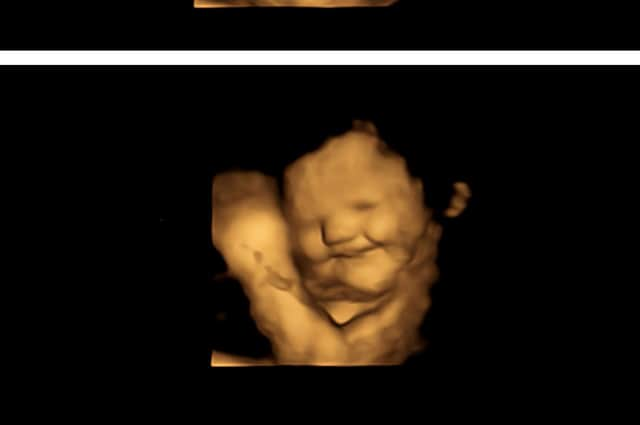Babies in the womb ‘smile’ for carrots and grimace for greens, scans show


For the first time, scientists recorded evidence that babies react differently to various smells and tastes while in the womb by recording their facial expressions.
Experts from Durham University took 4D ultrasound scans of 100 pregnant women to study how their unborn babies responded after being exposed to flavours from foods eaten by their mothers.
Advertisement
Hide AdAdvertisement
Hide AdThey looked at how the foetuses reacted to either carrot or kale flavours a short time after the flavours had been ingested by the mothers.
Foetuses exposed to carrot showed more ‘laughter-face’ responses while those exposed to kale showed more ‘cry-face’ responses.
Their findings could further understanding of how human taste and smell receptors develop, the university’s Fetal and Neonatal Research Lab said.
They also believe what mothers eat during pregnancy could influence babies’ taste preferences after birth and might have implications for establishing healthy eating habits.
Advertisement
Hide AdAdvertisement
Hide AdIt is thought foetuses experience flavour by inhaling and swallowing amniotic fluid in the womb.
Postgraduate Beyza Ustun, who led the research, said: “A number of studies have suggested that babies can taste and smell in the womb, but they are based on post-birth outcomes while our study is the first to see these reactions prior to birth.
“As a result, we think that this repeated exposure to flavours before birth could help to establish food preferences post-birth, which could be important when thinking about messaging around healthy eating and the potential for avoiding ‘food-fussiness’ when weaning.
“It was really amazing to see unborn babies’ reaction to kale or carrot flavours during the scans and share those moments with their parents.”
Advertisement
Hide AdAdvertisement
Hide AdMothers were scanned at 32 and 36 weeks pregnancy to see foetal facial reactions to the kale and carrot flavours.
Mothers were given a single capsule containing approximately 400mg of carrot or 400mg kale powder around 20 minutes before each scan and did not consume anything with a flavour for an hour before.
Facial reactions seen in both flavour groups, compared with foetuses in a control group who were not exposed to either flavour, showed that exposure to just a small amount of carrot or kale flavour was enough to stimulate a reaction.
Co-author Professor Nadja Reissland, who heads the Fetal and Neonatal Research Lab, said: “This latest study could have important implications for understanding the earliest evidence for foetal abilities to sense and discriminate different flavours and smells from the foods ingested by their mothers.”
Comment Guidelines
National World encourages reader discussion on our stories. User feedback, insights and back-and-forth exchanges add a rich layer of context to reporting. Please review our Community Guidelines before commenting.